
European perspective for Moldova
This is a transcript of the speech of Valeriu Ghilețchi (Moldova) at the State of Europe Forum 2019 in Bucharest.
The Eastern Partnership, which was signed ten years ago, has played a very important role for Moldova. When this partnership was launched, we had great hopes.
After the protests of April 2009 in Moldova and the ten years of the Communist party being in power, there was a lot of changes in Moldova and a very high expectation regarding the European integration. The Eastern Partnership became a roadmap. In the beginning Moldova was successful. Unfortunately I can’t talk about the finish line yet as the situation is not as positive as it was in the beginning.
However, Moldova has achieved several achievements in spite of many challenges. Among the six former Soviet countries that have signed the Eastern Partnership, Moldova was a success story. The visa free travel, which Moldova obtained before Georgia and Ukraine, was a big achievement for the country. In 2019, five years after the visa free regime had been achieved in Moldova, about two million Moldovans have travelled to Europe, that is more than half of the country’s population based on this regime. This was a great blessing for our citizens. Of course some have used this opportunity to find jobs somewhere else. But still, this free movement of citizens is a great achievement.
Regarding the Association and Free Trade Agreements, they also brought a lot of advantages for Moldova, especially since the time the Russian Federation introduced the embargo which has generated a lot of challenges for Moldova. As of 2019, some of the figures that I have is that 70% of Moldova’s export was through the EU countries. The Agreement is therefore a great advantage for Moldova.
Moldova, Georgia and Ukraine still have the greatest potential with regards to European integration. We have the same hopes. Last year, we launched a trilateral cooperation between the three countries because with regards to Armenia, Azerbaijan and Belarus, the situation of these countries is different. Georgia, Ukraine and Moldova share many similarities and progresses are more or less the same. We share also some similar challenges. All three countries have frozen conflicts. Moldova has Transnistria, Ukraine has Crimea and the Eastern part of Ukraine and Georgia has South Ossetia and Abkhazia. We are in a way in the same boat.
With regards to justice and the fight of corruption, we still have a lot to do. As of today, because of some of scandals, we are in a crisis. Moldova had parliamentary elections on the February 24th2019. More than two months later, we are still in discussions and we might have soon elections. But I believe that the crisis will be overcome. The point that I want to make is that, in recent years during the European Integration Process, we also wanted to have the perspective of membership, but it is not clear to this day. Even though we do our homework, we are aware of this lack, so this incentive is very important. And I am thankful that Romania has been very cooperative and favourable in the partnership. With the Romanian presidency, there is hope. Unfortunately in Chisinau, we don’t have a full power government to talk with. But with regards to partnership, I do believe that this would be very important.
I was this week (May 2019) in Ukraine. There were people from Georgia as well. They don’t understand why the EU member-states are reserved and don’t want to give the promise or at least the perspective to our nations. For example, North Macedonia got that perspective of membership, even though it will take time because it is a process.
To conclude this, Eastern Partnership has been a great blessing for the Republic of Moldova. We have achieved a lot – visa free regime, free trade agreement – but we hope that as time goes, we will learn from our mistakes, and hopefully, in the EU, as it was for Romania, would be able to open the European perspective which, for the Republic of Moldova is, I believe, very important.
Valeriu Ghilețchi
Picture: April 2009 protests in Moldova – source: Wikipedia – author: tolea93 – license: https://creativecommons.org/licenses/by-sa/3.0/legalcode

This Post Has 0 Comments